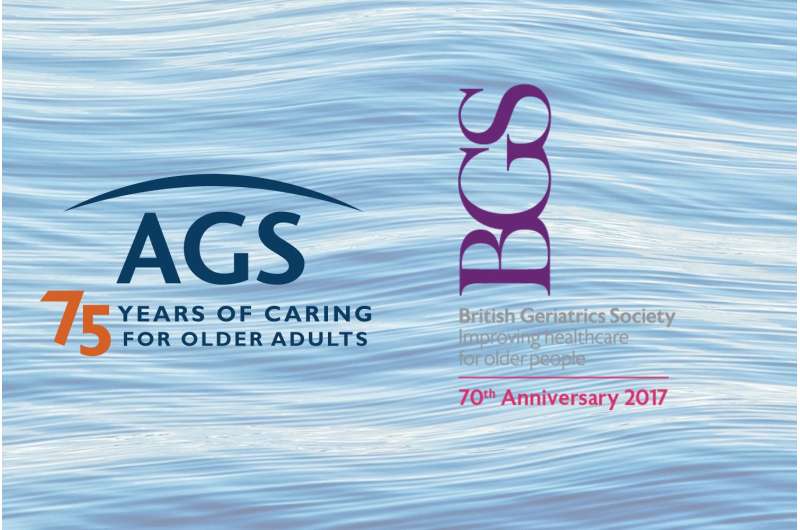New collaboration looks for trans-Atlantic common ground in geriatrics

Healthcare professionals across the Atlantic and around the world need to think beyond single-disease guidelines as they look to provide high-quality, person-centered care for more and more older adults living with multiple chronic conditions, so say editors from the Journal of the American Geriatrics Society and the British Geriatrics Society's (BGS's) Age and Ageing in the first from a series of joint editorials launched today. The series will look for common ground in geriatrics "across the pond," beginning here with the U.K.'s National Institute for Health and Care Excellence (NICE) guideline on multimorbidity, the medical term for those living with several chronic health concerns.
"The National Institute for Health and Care Excellence (NICE) guideline on multi-morbidity challenges physicians and health care providers to adopt an holistic approach that takes full and proper account of multimorbidity. It addresses a common flaw in all contemporary health services that frail, multi-morbid patients are often subjected to futile or even harmful investigations and treatments," note David J. Stott, MBChB, MD, FRCP, and John Young, MSc, authors of the BGS editorial and Editor-in-Chief and Associate Editor, respectively, of Age and Ageing.
Added William B. Applegate, MD, MPH, AGSF, Editor-in-Chief of the Journal of the American Geriatrics Society and author of joint commentary from the American Geriatrics Society (AGS): "These editorials quite literally cross an ocean to expand our expertise. We hope they will broaden dialogue on shared priorities today, and so shape better care and policies tomorrow."
In their jointly published editorials, Dr. Applegate, Prof. Stott and Prof. Young discuss regional and trans-Atlantic reactions to the NICE guideline "Multimorbidity: Clinical assessment and management." The guideline builds on previous work by an AGS expert panel, addressing what remains a top-priority for geriatrics health care professionals in the U.K., U.S., and elsewhere: coordinating care for the growing number of older adults who live with multiple chronic conditions. Following the publication of the initial editorial, Prof. Stott will be Chairing a special symposium at The British Geriatrics Society's Spring Meeting on 27 April 2007 in Newcastle, England, addressing multimorbidity. Dr. John Hindle, Consultant Geriatrician and Honorary Senior Lecturer at Bangor University in Wales, will be the key speaker on the issue.
The World Health Organization has already declared the rise in chronic conditions a worldwide epidemic. They account for more than 65 percent of total health expenditures in high-income countries like the U.K. and U.S., and can contribute to more than 60 percent of deaths reported annually across the globe. Against this backdrop, guidance like the NICE guidelines and the work of the AGS's Expert Panel on the Care of Older Adults with Multimorbidity remain essential because they respond to and respect the multifaceted nature of managing multiple health concerns simultaneously.
AGS and BGS experts commend the U.K.'s guidance as both "comprehensive and compelling." It embraces a growing trend in Europe and North America for eliciting "person-centered care goals" that account for individual preferences across care for several different conditions. The guideline also transcends traditionally limited organ-specific approaches to care, balancing the benefits and burdens of recommendations across the whole of an older person's well-being. According to the AGS-BGS experts: "The aim is to give the recipients of care control over decisions and actions affecting their health...a philosophy of clinical practice that should be integral to the management of all patients, multimorbid or not."
More information: William B. Applegate, Across the Pond, Journal of the American Geriatrics Society (2017). DOI: 10.1111/jgs.14803


















